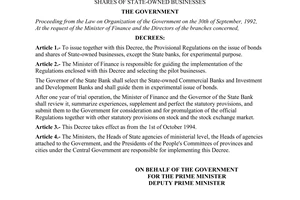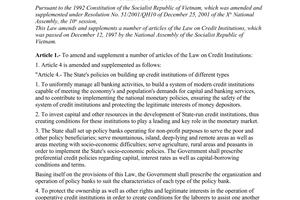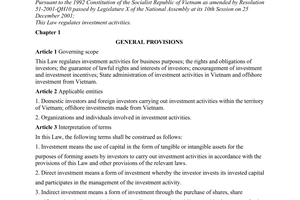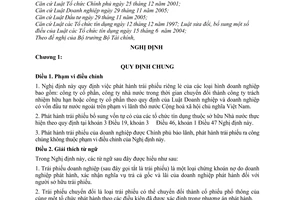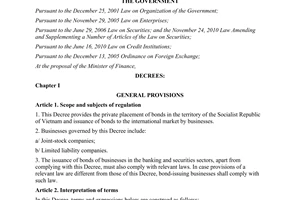Decree No. 52/2006/ND-CP of May 19, 2006, on issuance of enterprise bonds đã được thay thế bởi Decree No. 90/2011/ND-CP on issuance of corporate bonds và được áp dụng kể từ ngày 01/12/2011.
Nội dung toàn văn Decree No. 52/2006/ND-CP of May 19, 2006, on issuance of enterprise bonds
|
THE
GOVERNMENT |
SOCIALIST
REPUBLIC OF VIET NAM |
|
No. 52/2006/ND-CP |
Hanoi, May 19, 2006 |
DECREE
ON ISSUANCE OF ENTERPRISE BONDS
THE GOVERNMENT
Pursuant to the December 25, 2001 Law on Organization
of the Government;
Pursuant to the November 29, 2005 Enterprise Law;
Pursuant to the November 29, 2005 Investment Law;
Pursuant to the December 12, 1997 Law on
Credit Institutions and the June 15,
2004 Law Amending and Supplementing a Number of Articles of the Law on
Credit Institutions,
At the proposal of the Minister of Finance,
DECREES:
Chapter I
GENERAL PROVISIONS
Article 1.- Scope of regulation
1. This Decree provides for separate issuance of bonds by enterprises of different types, including joint-stock companies, state companies in the course of transformation into limited liability companies or joint-stock companies under the provisions of the Enterprise Law, and foreign-invested enterprises in the territory of the Socialist Republic of Vietnam.
2. Issuance of bonds to raise capital for addition to own capital of state-owned credit institutions shall comply with the provisions of Clause 3 of Article 19, Clause 3 of Article 46, and Clause 1 of Article 47 of this Decree.
3. Issuance of government-underwritten enterprise bonds and public offering of bonds shall not be governed by this Decree.
Article 2.- Interpretation of terms
In this Decree, the following terms are construed as follows:
1. Enterprise bond (hereinafter referred to as bonds for short) means a type of debit securities issued by enterprises acknowledging their obligation to pay both bond principals and interests to bondholders.
2. Convertible bond means a type of bond convertible into ordinary share of the same issuing organization under the conditions set in the issuance plan.
3. Inconvertible bond means a type of bond that is not convertible into share.
4. Secured bond means a type of bond for which the payment of its principal and interest is wholly or partly secured upon its maturity with assets of the issuing organization or of a third party or is underwritten by a financial or credit institution.
5. Unsecured bond means a type of bond for which the payment of its principal and interest is not wholly or partly secured upon its maturity with assets of the issuing organization or of a third party or is underwritten by a financial or credit institution.
6. Bond issuance means the initial sale of bonds to buyers.
7. Separate issuance of bonds means cases of bond issuance other than public offering in accordance with the provisions of law on securities and security market.
8. Issuing organization means an enterprise issuing bonds under the provisions of this Decree.
9. Issuance underwriting means the commitment made by an issuance underwriting organization to an issuing organization to carrying out procedures before issuing bonds or distributing bonds to investors, accepting to buy up bonds for resale or to buy up undistributed quantities of bonds.
10. Issuance agency means the sale of bonds to investors by organizations under the mandate of an issuing organization.
11. Payment agency means the payment of principals and interests of bonds upon maturity by organizations under the mandate of an issuing organization.
12. Bond bidding means the selection of bidding organizations and individuals that meet the requirements set by an issuing organization.
13. Bidding based on interest rate competition means a bidding whereby bidding organizations and individuals offer their interest rate bids to the issuing organization or a mandated organization for selecting the winning interest rate.
14. Bidding not based on interest rate competition means a bidding whereby bidding organizations and individuals, rather than offering interest rate bids, register to buy bonds with the winning interest rate determined on the basis of the results of bidding based on interest rate competition.
15. Right certificate means a type of security issued together with bonds, acknowledging bondholders' right to buy a certain quantity of ordinary shares under given conditions.
16. Bond-into-share conversion ratio means the ratio for determining the quantity of ordinary shares to be received by a bondholder when converting a bond into shares.
17. Bond conversion period means the duration from the time an issuing organization starts the conversion of bonds till the time it finishes the conversion.
18. Bond pledge means the hand-over of bonds by a bondholder to another organization or individual for custody to secure the fulfillment of civil obligations.
19. Credit rating organization means a legal person with the function to assess the degree of credit of enterprises and the capability of issuing organizations to pay bond principals and interests throughout the term of bonds.
20. Bond custody means the deposit of bonds by a bondholder at an organization licensed to keep and preserve bonds for this organization to perform the rights over such bonds for the bondholder.
Article 3.- Principles of bond issuance
1. Enterprises shall issue bonds on the principles of self-borrowing, self-payment and accountability for efficient use of borrowed capital.
2. Bond issuance activities must ensure publicity, transparency, equality and protection of legitimate rights and interests of investors.
3. The issuance of bonds must comply with the provisions of this Decree and other relevant provisions of law.
Article 4.- Purposes of use of the proceeds from the issuance of bonds
1. Execution of investment projects.
2. Restructuring of medium-term and long-term loans.
3. Increase of working capital.
Article 5.- Currencies used in bond issuance and payment
Enterprise bonds may be issued and paid in Vietnam dong.
Bonds of credit institutions may be issued and paid in Vietnam dong and foreign currencies according to the regulations of the State Bank of Vietnam.
Article 6.- Forms of bonds
Bonds shall be issued in the forms of certificate, book entry or electronic data.
Article 7.- Par value of bonds
Enterprise bonds shall carry a minimum par value of VND 100,000 (one hundred thousand Vietnam dong). Other par values shall be multiples of VND 100,000.
Par values of bonds shall be decided by issuing enterprises for each drive of issuance.
Article 8.- Buyers of enterprise bonds
1. Buyers of enterprise bonds are Vietnamese organizations and individuals; overseas Vietnamese; and foreign organizations and individuals.
2. Vietnamese organizations shall not be allowed to buy enterprise bonds with their state budget funds.
Article 9.- Bond interest rates
1. Depending on their credit, the effectiveness of investment projects and the situation of the financial market and monetary market, bond-issuing enterprises shall decide on bond interest rates for each drive of issuance.
2. Bond interest rates may be fixed throughout the whole term of bonds or be floated on the market.
In case of issuance of bonds with floating interest rates, issuing organizations shall publicize the reference interest rates serving as the basis for determining the interest rates applicable to bond holders.
3. Bond interests shall be paid by the following methods:
a/ Periodical payment;
b/ Payment upon issuance;
c/ Lump-sum payment together with the principal upon maturity.
Article 10.- Scope of transaction of bonds
1. Enterprise bonds shall be freely transferred, donated, given away as gifts, bequeathed or used for discount, mortgage or pledge in credit relations according to current provisions of law.
Enterprises shall not be allowed to use their issued bonds for discount, mortgage or pledge in credit relations.
2. The trading of bonds on the monetary market; the listing, registration, custody and trading of bonds at securities trading centers (stock exchanges) shall comply with the relevant provisions of law.
3. Bonds shall not be used in substitution for money in circulation and performance of financial obligations to the State.
Article 11.- Buyback of immature bonds
Issuing organizations may buy back issued bonds prior to maturity.
Article 12.- Custody and deposit of bonds
Bondholders may place their bonds under the custody of licensed security custody organizations or deposit them at credit institutions for preservation according to the provisions of law.
Article 13.- Responsibilities of bond-issuing organizations
1. To use the proceeds from the issuance of bonds for the purposes already committed with investors.
2. To pay in full and on time the principals and interests of bonds upon maturity.
3. To fulfill the information disclosure obligation and take responsibility for the accuracy and truthfulness of disclosed information.
4. To fulfill the responsibilities already committed with issuance-underwriting organizations, issuance agents, payment agents and organizations mandated to organize bond biddings.
5. To implement the regimes of financial management, reporting, accounting and statistics as provided for by law.
Article 14.- Benefits of bond buyers
1. To be guaranteed by issuing organizations for full and on-time payment of principals and interests of bonds upon maturity.
2. To transfer, donate, give away as gifts, bequeath, discount, mortgage and pledge bonds in civil relations in accordance with the provisions of law.
Article 15.- Payment in case of lost or damaged bonds
1. Bearer bonds which are lost or are so torn off or damaged that their original shape and contents are unidentifiable shall not be paid.
2. For registered bonds which are lost, torn off or damaged, if the persons who have lost their bonds can prove their right to own their bonds and the payment of such bonds has not yet been taken advantage of, such bonds shall be paid by the issuing organizations when they become mature.
Article 16.- Handling of acts of counterfeiting bonds
All acts of taking advantage of or counterfeiting bonds shall, depending on the nature and severity of their violation, be handled in accordance with the provisions of law.
Chapter II
CONDITIONS FOR AND COMPETENCE TO DECIDE ON ISSUANCE OF BONDS
Article 17.- Conditions for issuance of bonds
Enterprises may issue bonds if fully meeting the following conditions:
1. Being subjects defined in Clause 1, Article 1 of this Decree.
2. Having operated for at least one year from the date they officially commence operation.
3. Presenting the audited financial statement of the year preceding the year of issuance.
4. Generating profits from their production and business activities in the year preceding the year of issuance.
5. Having a bond issuance plan approved by a competent organization or individual.
Article 18.- Bond issuance plans
1. Issuing organizations shall work out a bond issuance plan serving as a basis for organizing the issuance of bonds and publicize it among investors.
2. A bond issuance plan shall contain the following details:
a/ Purpose of issuance of bonds;
b/ Information on the enterprise' business lines and operation results;
c/ Quantity, term and interest rate of bonds to be issued;
d/ Conversion ratio, conversion period and range of share price fluctuations (for issuance of convertible bonds);
e/ Modes of issuance of bonds and organizations underwriting the issuance and underwriting the payment of bonds, issuance agents and payment agents;
f/ Places of sale of bonds and payment of bond principals and interests;
g/ Planned arrangement of sources for payment of bond principals and interests;
h/ Other commitments to bondholders.
Article 19.- Adoption of bond issuance plans
1. The shareholders' meetings shall adopt plans on issuance of convertible bonds. General directors (directors) of enterprises shall organize the implementation of these plans.
2. The Management Board, Members' Council or capital owners' representatives shall adopt plans on issuance of inconvertible bonds. General directors (directors) of enterprises shall organize the implementation of these plans.
3. For bonds to raise capital for addition to own capital of state-owned credit institutions and bonds of state enterprises (including state companies, state joint-stock companies, state-owned one-member limited liability companies and state-owned limited liability companies with two or more members in the course of required transformation), their issuance plans shall be subject to approval of the Ministry of Finance.
Chapter III
TYPES OF ENTERPRISE BONDS
Section 1. CONVERTIBLE BONDS
Article 20.- Issuers of convertible bonds
Convertible bonds shall be issued by joint-stock companies.
Article 21.- Principles of issuance of convertible bonds
1.At the time of issuance of bonds, information on bond conversion conditions, conversion period and conversion ratio, the range of share price fluctuations, the purpose of use of the proceeds from the issuance of bonds and other benefits of bondholders shall be made public.
2. The rate of participation by foreign parties in Vietnamese enterprises shall be ensured according to the Prime Minister's regulations in each period.
3. The total quantity of issued bonds shall not exceed the approved issuance limit.
Article 22.- Bond conversion period
The bond conversion period shall be determined by issuing organizations and made public to investors at the time of issuance of bonds.
Article 23.- Bond conversion ratios
1. Bond conversion ratios shall be determined by issuing organizations at the time of issuance.
2. At the time of bond conversion, if the share price changes beyond the range of share price fluctuations announced at the time of issuance of bonds, enterprise owners may adjust the bond conversion ratios as appropriate.
Article 24.- Assurance of payment of convertible bonds
1. Convertible bonds may be secured or unsecured.
2. Bonds shall be secured by the following modes:
a/ Payment underwriting by financial or credit institutions;
b/ Security with assets of issuing organizations;
c/ Security with assets of a third party.
3. The Ministry of Finance shall specify the assurance of payment of issued bonds.
Article 25.- Right certificates issued together with convertible bonds
1. Right certificates issued together with convertible bonds shall certify bondholders' right to buy a certain quantity of ordinary shares of issuing organizations under given conditions.
2. Upon issuance of bonds, issuing organizations shall disclose information relating to right certificate holders' right to buy ordinary shares on:
a/ Conditions for right certificate holders to by ordinary shares.
b/ Quantity of shares which each right certificate-holding unit is entitled to buy.
c/ Other benefits and liabilities of right certificate holders.
Section II. INCONVERTIBLE BONDS
Article 26.- Issuers of inconvertible bonds
1. State enterprises.
2. Joint-stock companies.
3. Limited liability companies.
4. Foreign-invested enterprises in Vietnam.
Article 27.- Principles of issuance of inconvertible bonds
1. The purpose of use of the proceeds from the issuance of bonds shall be made public.
2. The total quantity of issued bonds shall not exceed the approved issuance limit.
Article 28.- Assurance of payment of inconvertible bonds
Inconvertible bonds may be secured or unsecured.
The assurance of payment of inconvertible bonds shall comply with the provisions of Article 24 of this Decree.
Article 29- Right certificates issued together with inconvertible bonds
1. Only joint-stock companies may issue right certificates issued together with inconvertible bonds.
2. The issuance of right certificates together with inconvertible bonds shall comply with the provisions of Article 25 of this Decree.
Chapter IV
BOND ISSUANCE MODES
Section I. BOND ISSUANCE UNDERWRITING
Article 30.- Bond issuance underwriting organizations
1. Enterprise bond issuance underwriting organizations include securities companies and other financial institutions as provided for by law.
2. The Ministry of Finance shall provide for criteria for bond issuance underwriting organizations and publish them every year for bond-issuing enterprises and bond issuance underwriting organizations to comply with.
Article 31.- Modes of bond issuance underwriting
1. The enterprise bond issuance may be underwritten by one or several organizations at a time.
2. In case many organizations jointly underwrite the issuance of bonds, they shall do so by the mode of co-underwriting the issuance of bonds.
Article 32.- Charges for bond issuance underwriting
1. Charges for bond issuance underwriting shall be agreed upon between issuing organizations and issuance-underwriting organizations.
2. Charges for bond issuance underwriting shall be included in bond issuance expenses and accounted as business costs or into the value of projects funded with the proceeds from the issuance of bonds.
Section II. BOND ISSUANCE AGENCY
Article 33.- Bond issuance agency organizations
1. Bond issuance agency organizations are securities companies, credit institutions and other financial institutions as provided for by law.
2. The Ministry of Finance shall provide for criteria for organizations acting as enterprise bond issuance agents.
Article 34.- Modes of bond issuance agency
1. Bond-issuing organizations may mandate one or several organizations to act as bond issuance agents.
2. Issuance agents shall sell bonds to investors according to their commitments to issuing organizations. Agents may return any unsold quantities of bonds to issuing organizations.
Article 35.- Charges for bond issuance agency
1. Charges for bond issuance agency shall be agreed upon between issuing organizations and bond issuance agents.
2. Charges for bond issuance agency shall be included in bond issuance expenses and accounted as business costs or into the value of projects funded with the proceeds from the issuance of bonds.
Section III. BIDDING FOR BONDS
Article 36.- Modes of bidding for bonds
Bond-issuing organizations may opt for the following bidding modes:
1. Direct bidding at bond-issuing organizations.
2. Bidding through intermediary financial institutions.
3. Bidding through securities trading centers (stock exchanges).
Article 37.- Principles of bidding for bonds
1. Confidentiality of information supplied by bidding organizations and individuals.
2. Equality between bidding organizations and individuals.
3. Interest rate-based competition among bidding organizations and individuals.
Article 38.- Eligible participants in bidding for bonds
1. Eligible bidders for bond are organizations and individuals specified in Article 8 of this Decree.
2. Bidders for bonds through securities trading centers (stock exchanges) must meet all conditions required by law.
Article 39.- Forms of bidding for bonds
1. Bidding based on interest rate competition.
2. Combination of bidding based on interest rate competition and bidding not based on interest rate competition.
In each drive of bidding, the quantity of bonds put up for a bidding not based on interest rate competition shall be decided by issuing organizations but shall not exceed 30% of total quantity of bonds announced to be issued in that drive of bidding.
Article 40.- Charges for bond bidding
1. Charges for bond bidding shall be agreed upon between issuing organizations and organizations mandated to hold a bond bidding.
2. Charges for bond bidding shall be included in bond issuance expenses and accounted as business costs or into the value of projects funded with the proceeds from the issuance of bonds (including cases of bond bidding organized by issuing organizations themselves).
Chapter V
DISCLOSURE OF INFORMATION
Article 41.- Principles of disclosure of information
1. Assurance of full and timely supply of necessary information for bond buyers.
2. Issuing organizations, audit organizations, credit-rating organizations (if any) shall be accountable for the accuracy and truthfulness of disclosed or certified information.
Article 42.- Information on bond issuance to be disclosed
1. Audited financial statements of the year preceding the year of issuance.
2. Bond issuance plans adopted by competent organizations or individuals.
3. Rating results of credit-rating organizations with respect to bond-issuing organizations and issued bonds (if any).
4. Benefits of bond buyers and commitments of bond-issuing organizations.
Article 43.- Disclosure of information
Issuing organizations shall disclose information according to the following provisions:
1. To publish information on the issuance of bonds on at least 3 consecutive issues of 01 central newspaper or 01 local newspaper in the locality where the issuing organization is headquartered.
2. To publicly post up information stated in Article 42 of this Decree at the head offices of the issuing organization, issuance-underwriting organizations, issuance agents, bidding organizations and places of distribution of bonds.
Depending on the practical conditions, issuing organizations may make use of other means to disclose information, such as radio stations, television stations, on-line newspapers, websites, etc.
Chapter VI
PAYMENT OF BOND PRINCIPALS AND INTERESTS
Article 44.- Sources for payment of bond principals and interests
1. Bond-issuing organizations shall be responsible for arranging sources for payment of bond principals and interests to bondholders from the basic depreciation sources of investment projects and other lawful capital sources of enterprises.
2. For secured bonds, when issuing organizations cannot balance the source for payment, security assets shall be sold for payment of debts upon maturity.
In case the payment of bonds is underwritten by financial or credit institutions, these institutions shall have to arrange sources of capital for payment of debts to bondholders. Issuing organizations shall be obliged to acknowledge debts and pay them to payment underwriting organizations or a third party according to the committed conditions.
Article 45.- Organization of payment of bond principals and interests
1. Issuing organizations may directly pay bond principals and interests to bondholders or mandate qualified financial or credit institutions to do so.
2. Issuing organizations and payment agents may commit to advance payment agents' capital for paying bond principals and interests to bondholders. Issuing organizations shall have to refund the advanced capital to payment agents and pay capital use fees for the late refund as contracted between these organizations.
3. Charges for payment of bond principals and interests shall be included in bond issuance expenses and accounted as business costs or into the value of projects funded with the proceeds from the issuance of bonds.
Chapter VII
RESPONSIBILITIES OF STATE MANAGEMENT AGENCIES AND ENTERPRISE OWNERS' REPRESENTATIVES
Article 46.- The Ministry of Finance
1. To perform the unified state management of the issuance of enterprise bonds.
2. To oversee the debt safety limits applicable to state enterprises within the State's total debt safety limit.
3. To consider and approve bond issuance plans of organizations under the provisions of Clause 3, Article 19 of this Decree.
4. To stop the issuance of bonds by enterprises in violation of State regulations on issuance of bonds.
Article 47.- The State Bank
1. To consider and decide on the issuance of bonds by credit institutions in accordance with the provisions of the Law on Credit Institutions and the Law Amending and Supplementing a Number of Articles of the Law on Credit Institutions after getting the approval of the Ministry of Finance as provided for in Clause 3, Article 19 of this Decree.
2. To coordinate with the Ministry of Finance in giving guidance for credit institutions in performing bond issuance underwriting and agency operations.
3. To perform the state management of the use of enterprise bonds for transaction on the monetary market; discount, mortgage and pledge bonds in credit relations between credit institutions and bondholders in accordance with the provisions of law.
Article 48.- Representatives of enterprise owners
1. To approve bond issuance plans of enterprises under their management.
2. To monitor the issuance, use and payment of principals and interests of bonds upon maturity.
Chapter VIII
IMPLEMENTATION PROVISIONS
Article 49.- This Decree takes effects from July 1, 2006, and replaces the Government's Decree No. 120/ CP of September 17, 1994, promulgating the Temporary Regulation on the issuance of shares and bonds of state enterprises.
Article 50.- The Minister of Finance shall have to guide and organize the implementation of this Decree.
Article 51.- Ministers, heads of ministerial-level agencies, heads of Government-attached agencies, presidents of provincial/municipal People's Committees; Management Boards, Members' Councils, general directors and directors of bond-issuing enterprises shall have to implement this Decree.
|
|
ON
BEHALF OF THE GOVERNMENT |
